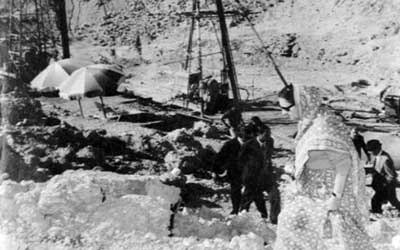Date: 20/05/2023
Relevance: GS-1: Modern Indian history from about the middle of the eighteenth century until the present- significant events, personalities, issues.
Key Phrases: Operation Smiling Buddha, Geopolitical Conditions, UNSC, Nuclear Non-Proliferation Treaty, Department of Atomic Energy, Nuclear Suppliers Group, Pokhran-II Tests.
Context:
- On May 18, 1974, India conducted its first nuclear tests in Pokhran, Rajasthan, as part of the operation codenamed 'Smiling Buddha.' This momentous event marked India's entry into the prestigious group of nations possessing nuclear capabilities.
Background : India's Nuclear Policy and Nonproliferation Treaty
- Underpinning India's nuclear aspirations were the prevailing international dynamics, including the Cold War rivalry between the United States and the Soviet Union.
- The devastating use of nuclear weapons in World War II and subsequent
nuclear tests by major powers necessitated the establishment of regulations
to prevent mass destruction.
- The Nuclear Nonproliferation Treaty (NPT) of 1968 aimed to curb the spread of nuclear weapons and technology.
- However, India objected to the treaty's discriminatory nature,
which favored the five permanent members of the United Nations Security
Council.
- The main issue was the lack of reciprocity, as non-nuclear states' commitment to refrain from developing nuclear weapons was not accompanied by a corresponding obligation on the part of states already possessing such weaponry.
Shaping India's Nuclear Ambitions: Domestic Developments
- Within India, scientists like Homi J. Bhabha and Vikram Sarabhai
had laid the groundwork for nuclear energy research and development.
- The Department of Atomic Energy (DAE), established in 1954, propelled India's scientific capabilities.
- Despite initial skepticism, subsequent changes in leadership and external events, such as the war with China in 1962, altered India's perspective on nuclear weapons.
- Pokhran-I: The First Nuclear Test: Prime Minister Indira Gandhi,
unlike her predecessors, did not hold a negative view of nuclear tests.
- However, recognizing the restrictions imposed by the NPT, India chose to conduct the tests discreetly.
- The decision was met with internal debates, but ultimately, Indira Gandhi gave the go-ahead, leading to the successful detonation of a nuclear device with a yield of 12-13 kilotons at Pokhran on May 18, 1974.
Non-Proliferation Treaty (NPT) 1970
- It is a multilateral treaty to limit the spread of nuclear weapons
and aims to achieve:-
- Non-proliferation
- Disarmament
- Peaceful use of nuclear energy
- It was signed in 1968 and entered into force in 1970. The articles of this treaty were debated and discussed at the Committee on Disarmament.
- It divides the world into Nuclear ‘Haves’ and ‘Have-Nots’
- Nuclear Weapons States (NWS) are those states that have manufactured and exploded a nuclear weapon or other nuclear explosive devices before 1 January 1967.
- This qualifies following counties as the only 5 NWS:
- China,
- France,
- Russia (erstwhile USSR),
- The United Kingdom and
- The United States of America
- Non-nuclear Weapon States (NNWS) are instructed to not receive fissile materials and related technology (for production/ transfer of nuclear weapons).
- The treaty doesn’t prohibit countries to develop capabilities to undertake peaceful use of energy.
International Backlash and Diplomatic Challenges:
- Following the tests, India faced significant criticism and repercussions from the international community.
- The United States, in particular, imposed restrictions on nuclear assistance to India, with the signing of the Nuclear Non-Proliferation Act in 1978.
- However, India's position gradually evolved over the years, culminating in the historic India-US nuclear agreement in 2005, which marked a shift in global perception towards India's nuclear capabilities.
India's Quest for Global Recognition: The Nuclear Suppliers Group
- India's aspirations for global recognition as a responsible nuclear power led to its pursuit of membership in the Nuclear Suppliers Group (NSG) since 2008.
- The NSG sets guidelines for nuclear equipment exports and aims to prevent nuclear weapons proliferation.
- Despite initial resistance from some countries, India's track record as a responsible nuclear state and its commitment to nonproliferation have gradually garnered support from numerous nations, paving the way for potential NSG membership.
Conclusion:
- India's first nuclear tests in Pokhran, Rajasthan, in 1974 marked
a significant milestone in its nuclear journey.
- Driven by geopolitical circumstances and the need to establish its strategic deterrent, India conducted the 'Smiling Buddha' operation.
- Despite initial international backlash, India has worked to project itself as a responsible nuclear power, leading to increased acceptance and recognition on the global stage.
- As India continues to pursue its nuclear ambitions, its engagement with international nonproliferation efforts and its quest for NSG membership highlight its commitment to maintaining peace and stability in the.
Source: The Indian Express
Mains Question:
Q. Assess the significance of India's Pokhran-I nuclear tests in 1974 in shaping India's nuclear policy and its quest for global recognition as a nuclear power. (250 words).







